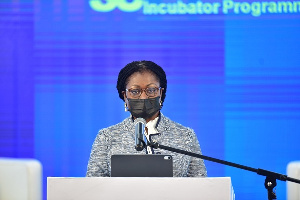Members of the Board of Directors, Standard Chartered Bank (Ghana)
Mrs. Mansa Nettey, Chief Executive, and the Management Team, Standard Chartered Bank (Ghana)
The President of Ashesi University Invited Guests,
Distinguished Ladies and Gentlemen
On 30th November 2020, I had the singular honour of launching the Women in Technology (WIT) Business Incubator programme of the Standard Chartered Bank (Ghana) and its partner, the Ghana Climate Innovation Centre of Ashesi University, under the theme, “Technology, Gender and Development – Expanding the Role of Technology in Women-Owned Businesses for National Development”.
The WIT Business Incubator programme set out to provide business incubation and financial support to women-led or women-owned businesses that desired to launch new technologies or grow their businesses with technology, while making a significant impact in their communities.
The imperative for such a programme was clear. While Ghana’s private sector is dominated by women entrepreneurs, second only to Uganda according to the 2019 MasterCard Index of Women Entrepreneurs, data suggests that women-owned businesses tend to remain smaller and less profitable than those of men, owing in part to the lack of access to business support services and lack of access to finance.
Indeed, female entrepreneurs in Ghana are eight percent less likely than men to get access to the kind of capital and other financial services and products that they need to start or scale up their businesses, according to the World Bank’s 2017 Global Findex Survey.
What is more, the participation of female entrepreneurs in Ghana’s fast-growing technology sector remains marginal although there is great potential for women to play a key role in this space.
The launch of the WIT business incubator programme, particularly in the midst of the COVID-19 pandemic with its attendant job losses and business failures, was a bold step towards helping to solve multiple policy challenges including women’s access to finance, job creation especially for youth, making businesses more resilient through the use of technology, and ultimately promoting a resilient bounce back of the Ghanaian economy post pandemic.
Ten months down the line, I am elated to be here as Special Guest of Honour at this graduation ceremony for the first cohort of the programme. It is gratifying to note that Standard Chartered Bank (Ghana) and its partner Ashesi University moved quickly into action after the launch, to make the programme a reality.
It is even more heart-warming to note that the programme received a high level of interest from the public, with a total of 220 applicants of which 14 were selected from five regions across the country following a rigorous process.
These 14 beneficiaries received entrepreneurship skills training over a four-month period, following which five of these firms received additional business support over a 10-week period and a grant of GHC57,000 each to help scale up their businesses.
This programme has no doubt been a major confidence booster for the young female entrepreneurs behind these businesses that graduate today. The programme has provided them with world-class business and entrepreneurial skills and exposure, which will go a long to help them build competitive and sustainable businesses that will stand the test of time.
The programme has also better prepared them to present their businesses to banks, private equity firms, and other investors to obtain financing for the next stage of growth. To the graduating cohort,
I congratulate all 14 of you. You have been able to develop and test your innovative technology-driven business ideas in the course of the last few months and your businesses are now ready to take off to help solve 5 some of Ghana’s challenges.
It is small businesses like yours that have the potential to create the majority of the jobs we need for the youth and help to make a real difference in our communities. Business success requires consistency, tenacity, and a commitment to following relevant rules, standards, and ethics to create lasting value for all stakeholders.
I encourage you to uphold the high standards of business management and entrepreneurship you have been introduced to and resolve to build strong and competitive businesses that can stand shoulder to shoulder with your peers across the African continent and beyond.
You have what it takes to become global players, with innovative technology-based business management tools and digital payment platforms that are currently available. We also expect you to mentor and support other entrepreneurs with what you have learnt so far, so that you can create even more impact for our economy.
For the five businesses that progressed to the 10-week phase with additional business support and grants, to whom much is given, much is expected. We expect even more from you in terms of business excellence, growth, and impact.
For the applicants who did not make it to the first cohort, better luck next time. I challenge future applicants to be bold and innovative in conceiving of their business ideas and to come out with real solutions to Ghana and Africa’s challenges, keeping in mind opportunities presented by the African Continental Free Trade Area (AfCFTA).
May I also remind you that Ghana’s budding fintech sector provides many opportunities that women entrepreneurs in the technology space could explore within the Bank of Ghana’s Regulatory Sandbox environment to test innovative applications that would help expand access to finance particularly for women entrepreneurs like yourselves.
The Bank of Ghana under the leadership of Governor Dr. Ernest Addison remains committed to promoting a policy and regulatory environment that supports inclusive and broad-based economic growth where all economic actors, particularly women and youth entrepreneurs, are able to innovate and access appropriate forms of finance and at cost-effective rates to help launch, grow, and sustain their businesses.
On behalf of Governor Ernest Addison, I congratulate Standard Chartered Bank (Ghana) once more for this valuable contribution to inclusive growth through women’s economic empowerment. It is our fervent hope the WIT Business Incubator programme will continue to expand and that many more women-led or women-owned businesses will benefit from it in the months and years ahead.
I call on other banks in Ghana to take a cue in the spirit of the Ghana Sustainable Banking Principles to help address the current gap in access to finance and business support services for female and youth entrepreneurs through innovative partnerships. It is imperative for all hands to be on deck as we find solutions to Ghana’s developmental challenges and ensure that no one is left behind in the new normal. Congratulations again, graduating cohort!
Ayekoo, and I wish you every success in life and in business
 Home Of Ghana News Ghana News, Entertainment And More
Home Of Ghana News Ghana News, Entertainment And More





